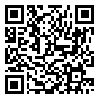Volume 7, Issue 1 (3-2023)
EBHPME 2023, 7(1): 5-12 |
Back to browse issues page
Download citation:
BibTeX | RIS | EndNote | Medlars | ProCite | Reference Manager | RefWorks
Send citation to:



BibTeX | RIS | EndNote | Medlars | ProCite | Reference Manager | RefWorks
Send citation to:
Ghaseminejad raeini M, Lakbala P. The Effect of Four Melhem's Empowerment Factors on the Empowerment of Staff in Hormozgan University of Medical Sciences, Iran. EBHPME 2023; 7 (1) :5-12
URL: http://jebhpme.ssu.ac.ir/article-1-410-en.html
URL: http://jebhpme.ssu.ac.ir/article-1-410-en.html
Department of Health Services Management, Faculty of Health, Hormozgan University of Medical Sciences, Bandar Abbas, Iran , parvin_lakbala@yahoo.com
Abstract: (1615 Views)
Background: The only sustainable competitive advantage of organizations is their employees. Capable and efficient manpower are the most important assets of organizations and communities. This will lead to sustainable development. The purpose of this study was to determine the effect of empowerment through four factors of ability (knowledge and skills, trust, motivation and communication) among the staff of Hormozgan University of Medical Sciences.
Methods: This was a descriptive study conducted in 2017.The statistical population consisted of 485 staff members of Hormozgan University of Medical Sciences. 215 people were selected by random sampling method. Then, the authors selected samples from each job category through stratified sampling method. To collect information, the authors used a standard empowerment questionnaire based on Melhem's model in addition to the demographic section. After distributing the questionnaire; t-student test and Spearman correlation were used to determine the status of research variables and also the type and extent of the relationship between them.
Results: According to the results of t-student test, the average of all variables was more than 3 indicating the appropriate status of employees' capabilities. Moreover, the results of Spearman correlation test showed that the relationship between independent variables and dependent variables in this test was significant. All research hypotheses (main hypothesis and four sub-hypotheses) were confirmed. The results of the correlation coefficient of the relationship between knowledge and skill variables with empowerment showed a moderate intensity, while the correlation coefficient of the relationship between the variables of motivation, trust and communication with empowerment showed a low intensity.
Conclusion: Due to the appropriate status of employees' empowerment, long-term empowerment programs are proposed to enhance employees' empowerment further.
Type of Study: Original article |
Subject:
General
Received: 2022/09/19 | Accepted: 2023/03/28 | Published: 2023/03/30
Received: 2022/09/19 | Accepted: 2023/03/28 | Published: 2023/03/30
References
1. Conger JA, Kanungo RN. The empowerment process: Integrating theory and practice. Academy of Management Review. 1988; 13(3): 471-82. [DOI: 10.2307/258093]
2. Nyhan R. Changing the paradigms: Trust and its roles in public sector organizations. Am Rev Public Adm. 2000; 30: 87-109. [DOI: 10.1177/02750740022064560]
3. Francis RS, Alagas EN. Hotel employees' psychological empowerment influence on their organizational citizenship behavior towards their job performance. Organizational Behavior Challenges in the Tourism Industry: IGI Global; 2020. p. 284-304. [DOI: 10.4018/978-1-7998-1474-0.ch016]
4. Thomas KW, Velthouse BA. Cognitive elements of empowerment: An “Interpretive” model of intrinsic task motivation. Academy of Management Review. 1990; 15(4): 666-81. [DOI: 10.5465/amr.1990.4310926]
5. AlKahtani N, Iqbal Sh, Sohail M, Sheraz F, Jahan S, Anwar B, et al. Impact of employee empowerment on organizational commitment through job satisfaction in four and five stars hotel industry. Management Science Letters. 2021; 11(3): 813-22. [DOI: 10.5267/j.msl.2020.10.022]
6. Meyerson G, Dewettinck B. Effect of empowerment on employees performance. Advanced Research in Economic and Management sciences. 2012; 2(1): 40-6.
7. Viseu J, Pinto P, Borralha S, de Jesus SN. Role of individual and organizational variables as predictors of job satisfaction among hotel employees. Tourism and Hospitality Research. 2020; 20(4): 466-80. [DOI: 10.1177/1467358420924065]
8. Wen J, Hou P,Huang S. Emotional intelligence, emotional labor, perceived organizational support, and job satisfaction: A moderated mediation model. International Journal of Hospitality Management. 2019; 81(1): 120-30. [DOI: 10.1016/j.ijhm.2019.01.009]
9. Choi SL, Goh ChF, Adam MBH, Tan OK. Transformational leadership, empowerment, and job satisfaction: The mediating role of employee empowerment. Human Resources for Health. 2016; 14(1): 73. [DOI: 10.1186/s12960-016-0171-2]
10. Zaraket WS, Garios R, Malek LA. The impact of employee empowerment on the organizational commitment. International Journal of Human Resource Studies. 2018; 8(3): 284-99. [DOI: 10.5296/ ijhrs.v8i3.13528]
11. Kariuki A, Kiambati K. Empowerment, organizational commitment, organization citizenship behavior and firm performance. Management Studies. 2017; 5(4): 290-300. [DOI: 10.17265/2328-2185/2017.04.003]
12. Melhem Y. The antecedents of customer‐contact employees’ empowerment. Employee Relations. 2004; 26(1): 72-93. [DOI: 10.1108/01425450410506913]
13. Dobre OI. Employee motivation and organizational performance. Review of Applied Socio-Economic Research. 2013; 5(1): 53-60.
14. Chow IH-S, Lo ThWCh, Sha Zh, Hong J. The impact of developmental experience, empowerment, and organizational support on catering service staff performance. International Journal of Hospitality Management. 2006; 25(3): 478-95. [DOI: 10.1016/ j.ijhm.2005.03.002]
15. Al Zahrani AA, Zamil AM, Araiqat AYM, Alsalhi N. The impact of antecedents supporting organizational innovation on employees’ psychological empowerment: An empirical study of Saudi and Jordanian industrial corporations. African Journal of Business Management. 2012; 6(24): 7329-43. [DOI: 10.5897/AJBM11.3032]
16. Blanchard KH, Zigarmi P, Zigarmi D. Leadership and the one minute manager. New York: William Morrow and Company; 2013
17. Mallak LA, Kurstedt HA. Understanding and using empowerment to change organizational culture. Industrial Management-Chicago Then Atlanta-. 1996; 38(6): 8-10.
18. Kassim ZA, Yusoff IYM, Fong NL. Job empowerment and customer orientation of bank employees in Kuching, Malaysia. Contemporary Management Research. 2012; 8(2). [DOI: 10.7903/ cmr.11048]
19. Damar A, Eskiler E. The impact of spiritual leadership on empowerment and work procrastination. SHS Web of Conferences. 2017; 37(7): 01056. [DOI: 10.1051/shsconf/20173701056]
20. Iranian foundation for human resource empowerment. Human Resource Empowerment & Iranian Human Resource Award Model. Andishe Gostar. Available from URL: https://ijms.ut.ac.ir/ article_71983_507b62168e2aee459bf36b5804e082d1.pdf. Last access: September 20, 2022. [In Persian]
21. Gkorezis P, Petridou E. The impact of extrinsic rewards on nurses. SAGE Journals. 2011; 24(2). [DOI: 10.1258/hsmr.2010.010004]
22. Ayupp K, Chung ThH. Empowerment: Hotel employees' perspective. Journal of Industrial Engineering and Management. 2010; 3(3): 561-75. [DOI: 10.3926/jiem..v3n3.p561-575]
Send email to the article author
| Rights and permissions | |
 |
This work is licensed under a Creative Commons Attribution-NonCommercial 4.0 International License. |







